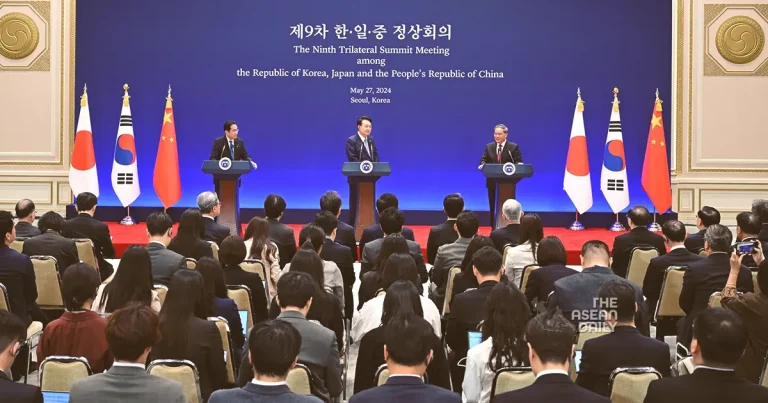28-5-2024 (SEOUL) In a significant development, the leaders of China, Japan, and South Korea convened in Seoul on Monday for the first trilateral summit in four years, marking a restart in relations between the East Asian economic powerhouses. Chinese Premier Li Qiang hailed the meeting as a “new beginning” and called for the comprehensive resumption of cooperation among the three nations.
The summit, hosted by South Korean President Yoon Suk-yeol and attended by Japanese Prime Minister Fumio Kishida, aimed to revitalize stalled negotiations on a three-party free trade agreement, which have been on hold since 2019. Efforts to revive trade and security dialogues, hampered by global tensions, were high on the agenda.
As the summit commenced, Premier Li Qiang struck an optimistic tone, stating that the meeting represented “both a restart and a new beginning.” He urged the comprehensive resumption of cooperation among the three countries, emphasizing the need to separate politics from economic and trade issues.
“For China, South Korea, and Japan, our close ties will not change, the spirit of cooperation achieved through crisis response will not change, and our mission to safeguard regional peace and stability will not change,” Li declared.
The trilateral summit itself was seen as a significant step forward for nations whose relations have been marked by suspicion, rancour, and occasional constructive engagement. Leif-Eric Easley, a professor at Ewha University in Seoul, observed, “The trilateral summit is more about reducing frictions than reshaping geopolitics.”
China, along with its allies South Korea and Japan, are navigating a complex web of mutual distrust amid the broader rivalry between Beijing and Washington, tensions over Taiwan, which China claims as its own, and the ongoing issue of North Korea’s nuclear program.
President Yoon and Prime Minister Kishida have charted a closer course with each other and with Washington, embarking on unprecedented three-way cooperation with the United States on military and other measures.
In the face of growing protectionism and supply chain decoupling, Premier Li called for an end to such practices. “We need to promote multipolarity in the world and oppose the formation of blocs or camps,” he asserted.
The joint declaration released after the summit outlined a commitment to formalize regular communication at the highest levels and collaborate on a range of issues, including climate change, conservation, health, trade, and international peace. The leaders also set an ambitious goal of boosting people-to-people exchanges to 40 million by 2030 through cultural, tourism, and educational initiatives.
On the contentious issue of North Korea’s planned rocket launch carrying a space satellite, which Yoon and Kishida condemned as a violation of UN Security Council resolutions, Li called for restraint from all parties to prevent further complications on the Korean peninsula. China, as North Korea’s sole military ally and largest trade partner, has been vocal in calling for an easing of UN sanctions.
Despite the summit’s focus on reviving trilateral cooperation, North Korea condemned the joint declaration, describing it as a “grave political provocation” that violates its sovereignty.




